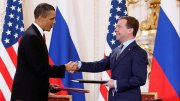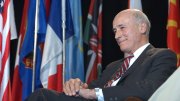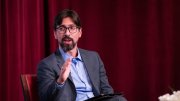When the United States declared war on al Qaeda, it simply repeated "a pattern that other democracies before us had followed in the wake of terrorist atrocities," says Louise Richardson, the departing executive dean of the Radcliffe Institute for Advanced Study (in January, she becomes principal of the University of St. Andrews in Scotland). "The urge to declare war in response to an atrocity on the scale of September 11 is very powerful," she notes, "and the decision to do so very understandable.... Any administration of any ideological persuasion would have been under enormous pressure to respond in precisely the same way." But in looking at democracies around the world, she says, "You see that military might does not translate into victory against terrorism...It hasn't worked for Britain, it didn't work for the Peruvians, it hasn't actually worked for the Russians." It worked for military dictators in Argentina, Chile, and Brazil, but "at a cost far higher than any democracy would be willing to pay."
Richardson argues instead that declaring war on terrorism is precisely what the U.S. government should not have done. Likewise, claiming rights that it is not prepared to concede to others, on an international stage, plays right into the hands of America's enemies.
What then, should guide the response? Richardson, Ph.D. '89, a political scientist who has written extensively on terrorism and has co-edited a comparative study of reactions by democratic governments, has found that the most effective ways to fight terrorism do not involve important tradeoffs between security and democratic principles. Her book What Terrorists Want outlines a six-point counterterrorist strategy that focuses on determining what terrorists need to sustain themselves, and then figuring out the best ways to thwart their ability to obtain it.
Terrorists are often idealists who "see themselves as playing David to our Goliath," she says. They are motivated by things like a desire for glory, the belief that they are fighting for a just cause, and by intense loyalty to a small band of brothers-motives not unlike those that "have animated soldiers for centuries."
By declaring war on them, the United States plays directly into their hands, she contends. The three things terrorists really want are "revenge, renown, and reaction." War gives them all three, providing "opportunities to exact revenge by the forward deployment of our troops in the region"...and "more actions to be avenged as the result of the conduct of the war." (The number of Afghan civilians killed in the first six months of the U.S. invasion there outnumbered the dead of September 11, she notes.) "And when the most powerful countries in the world declare war on what was, after all, a motley collection of extremists, living under the sponsorship of one of the poorest governments on the planet," the United States elevated their stature "to a height of which they could only have dreamt."
One of the best counterterrorist strategies is to separate terrorists from the communities in which they operate. "You see this in Egypt, you see this in Israel, you see it time and time again," Richardson says. Declaring war and mistreating prisoners helps the terrorists by making their opponents "look like the monsters they say we are," and by alienating "the community which forms the basis of their support" she points out.
The British government's history of fighting the Irish Republican Army is instructive. Before they learned from their mistakes, the British (who in general no longer use coercive interrogation because they have found surveillance more effective) did many things that helped the IRA, explains Richardson. They treated suspects in a way "that amounted to cruel and unusual treatment, short of torture. They abolished jury trials" and conducted special trials in which "one could secure a conviction on the basis of evidence from a single informer." Because their intelligence was very weak, the British picked up many people who were not involved in the IRA. "Internment without trial was introduced early on and used almost exclusively against Catholics," Richardson recalls. This further alienated "the entire minority community and ended up dramatically increasing the level of violence-and won recruits for the IRA."
"If you look at counterterrorist legislation writ large,” Richardson continues, "one of the iron laws of temporary counterterrorist legislation is that it's never temporary. It invariably stays on the books. And one of the risks is that its use gets expanded to non-terrorism cases and it starts to corrode our democracy." As examples of instances in which governments have used antiterrorist legislation in non-terrorism cases, Richardson points out that British prime minister Gordon Brown "recently used antiterrorist legislation to freeze assets of Icelandic banks, and the Chilean government recently used antiterrorist legislation against local indigenous populations."
In fighting terrorism, Richardson says, "We have wrongly assumed...that the purity of our motives is self-evident. We have also casually assumed that being tough on terrorism means being effective against terrorism." At home, political opposition to the U.S. government's counterterrorism policies has been "hamstrung," she argues, by a fear of appearing "soft." "Instead of worrying about what is tough on terrorism or what is soft on terrorism, I think we should focus exclusively on what is effective against terror. Every time we consider a new counter to terrorism, we should pause and ask ourselves one question: Is it effective? And only if the answer is 'Yes,' should we ask ourselves a second question: 'At what cost?' Because ultimately our democracy can never be derailed by somebody planting a bomb in our midst. It can be derailed only if we conclude that it is inadequate to defend us."







